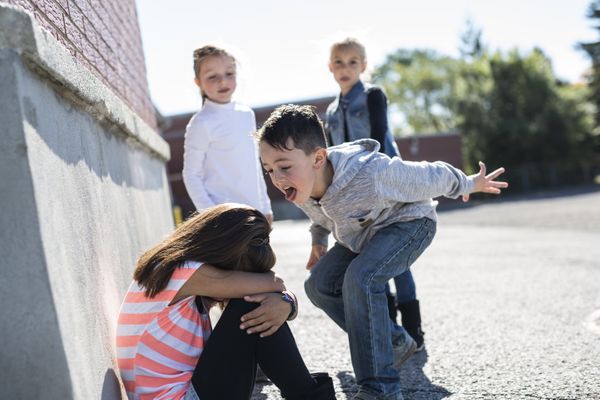10.1.2
Subcultural Theory
Status Frustration
Status Frustration
Albert Cohen researched working-class boys and how they face strain in the mainstream middle-class culture of the education system.


Cohen
Cohen
- Cohen researched working class boys and how they face strain in the mainstream middle class culture of the education system.
- They are unable to succeed in education which places them at the bottom of the official status hierarchy, not being able to achieve mainstream goals.


Status frustration
Status frustration
- As a result of being unable to achieve through legitimate means the boys suffer status frustration.
- They turn to others in the same situation and form a delinquent subculture with alternative values, rejecting the goals of the school.


Alternative status hierarchy
Alternative status hierarchy
- The boys form subcultures, based on their shared experiences and create new goals that are achievable to them, which tend to conflict with the middle class culture of the school.
- Cohen claimed this results in an 'alternative status hierarchy' as the boys are competing with each other to see who can be the best delinquent in the school.
Cloward and Ohlin
Cloward and Ohlin
Cloward and Ohlin argued not all subcultures respond to their failure in the same way. They suggested that there were three different forms of subculture that exist.


- Criminal subcultures
- Criminal subcultures
- Exist mainly in inner-city estates in which a criminal culture is dominant.
- It is easy for frustrated youths to learn criminal skills and have the opportunity to practice their trade.
- They have criminal role models to look up to and learn from.


- Conflict subcultures
- Conflict subcultures
- Also emerge in inner-city estates, particularly in areas that suffer from a high social turnover.
- It is difficult for a criminal culture to develop as different gangs battle with each other for overall control.


- Retreatist subcultures
- Retreatist subcultures
- Some youths who want to be criminals do not always succeed.
- These individuals become ‘double failures’ and are unlikely to succeed in professional or violent crime so turn to illegal drug use instead.
1Theory & Methods
1.1Sociological Theories
1.2Sociological Methods
2Education with Methods in Context
2.1Role & Function of the Education System
2.2Educational Achievement
2.3Relationships & Processes Within Schools
3Option 1: Culture & Identity
3.1Conceptions of Culture
3.2Identity & Socialisation
3.3Social Identity
3.4Production, Consumption & Globalisation
4Option 1: Families & Households
4.1Families & Households
4.2Changing Patterns
4.3The Symmetrical Family
4.4Children & Childhood
5Option 1: Health
5.1Social Constructions
5.2Social Distribution of Healthcare
5.3Provision & Access to Healthcare
5.4Mental Health
6Option 1: Work, Poverty & Welfare
6.1Poverty & Wealth
7Option 2: Beliefs in Society
7.1Ideology, Science & Religion
7.2Religious Movements
7.3Society & Religion
8Option 2: Global Development
8.1Development, Underdevelopment & Global Inequality
8.2Globalisation & Global Organisations
8.3Aid, Trade, Industrialisation, Urbanisation
9Option 2: The Media
9.1Contemporary Media
9.2Media Representations
10Crime & Deviance
10.1Crime & Society
10.2Social Distribution of Crime
Jump to other topics
1Theory & Methods
1.1Sociological Theories
1.2Sociological Methods
2Education with Methods in Context
2.1Role & Function of the Education System
2.2Educational Achievement
2.3Relationships & Processes Within Schools
3Option 1: Culture & Identity
3.1Conceptions of Culture
3.2Identity & Socialisation
3.3Social Identity
3.4Production, Consumption & Globalisation
4Option 1: Families & Households
4.1Families & Households
4.2Changing Patterns
4.3The Symmetrical Family
4.4Children & Childhood
5Option 1: Health
5.1Social Constructions
5.2Social Distribution of Healthcare
5.3Provision & Access to Healthcare
5.4Mental Health
6Option 1: Work, Poverty & Welfare
6.1Poverty & Wealth
7Option 2: Beliefs in Society
7.1Ideology, Science & Religion
7.2Religious Movements
7.3Society & Religion
8Option 2: Global Development
8.1Development, Underdevelopment & Global Inequality
8.2Globalisation & Global Organisations
8.3Aid, Trade, Industrialisation, Urbanisation
9Option 2: The Media
9.1Contemporary Media
9.2Media Representations
10Crime & Deviance
10.1Crime & Society
10.2Social Distribution of Crime
Unlock your full potential with Seneca Premium
Unlimited access to 10,000+ open-ended exam questions
Mini-mock exams based on your study history
Unlock 800+ premium courses & e-books